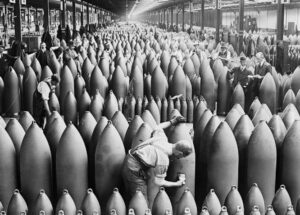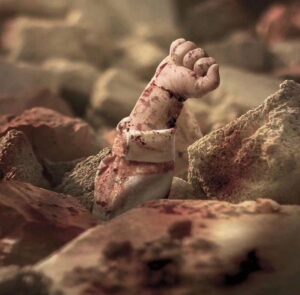It’s one thing to burrow beneath the ground, digging to construct a tunnel for refuge, a passage of goods, or to store weapons during a time of war. It’s quite another to use one hand, as a small child, to try and dig your way out of the rubble that has collapsed upon you.
Professor Mustafa Abu Sway, a professor based in Jerusalem,
spoke sadly of the reality in Gaza where, he said, “one child dies every ten minutes.”
“It was not the death of a child,” he said, ”but the survival of one, that made me really very, very sad.” He was speaking of a video which had emerged showing a child buried alive under rubble attempting to free herself with one hand.
When we think of how to rescue suffering children from the unbridled carnage of numerous wars that have forced people to go underground, the vast network of tunnels built by the Vietnamese come to mind. To this day, tourists in Viet Nam visit a network of tunnels created by the North Vietnamese, extending from the outskirts of Saigon to the borders of Cambodia. Construction of these tunnels, used both for shelter and by soldiers, began during the French occupation of Viet Nam. Eventually, the complex system gave the North Vietnamese a form of leverage in their effort to fight against the United States military.
Following the U.S. defeat in Viet Nam, weapon makers in the United States focused on developing ordnance that could destroy underground tunnels and bases. Bombs like the
Paveway (GBU-27) were used against Iraq in Operation Desert Storm where they were deployed on February 13, 1991 to attack the
Amiriyah shelter in Baghdad. At that time, families in the Amiriyah neighborhood had huddled overnight in the basement shelter for a relatively safe night’s sleep. The smart bombs penetrated the “Achilles’ heel” of the building, the spot where ventilation shafts had been installed.
The first bomb exploded and expelled 17 bodies out of the building. The second bomb followed immediately after the first, and its explosion sealed the exits. The temperature inside the shelter rose to 500 degrees Celsius and the pipes overhead burst, resulting in boiling water that cascaded down on the innocents who slept. Hundreds of people were burned alive.
In Afghanistan, on April 13th, 2017, The United States used a Massive Ordnance Air Blast bomb nicknamed MOAB, the Mother of All Bombs, to destroy a network of tunnels in the Hindu Kush mountains. The United States had helped the Mujahideen construct these tunnels during their war against the Soviet Union in the late 1970s.
The 21,000 pound MOAB, designed to destroy tunnel complexes and hardened bunkers, still affects the area where it was used.
Locals say this harsh terrain has been haunted by a deadly, hidden hazard: chemical contamination. According to one
local resident, Qudrat Wali, “All the people living in Asad Khel village became ill after that bomb was dropped.” The 27-year old farmer showed a journalist red bumps stretched across his calves and said, “I have it all over my body.” He said he got the skin disease from contamination left by the MOAB.
When Wali and his neighbors returned to their village, they found their land did not produce crops like it had before “We would get 150 kilograms of wheat from my land before, but now we cannot get half of that,” he says. “We came back because our homes and livelihoods are here, but this land is not safe. The plants are sick and so are we.”
One of the most alarming underground concentrations for massive destruction is located 53 miles from Gaza, where a complex now called the
Shimon Peres Negev Nuclear Research Center has developed at least 80 thermonuclear weapons. First built in 1958, the facility
underwent a major renovation just two years ago.
“To this day,”
writes Joshua Frank, “Israel has never openly admitted possessing such weaponry and yet has consistently
refused to allow inspectors from the International Atomic Energy Agency to visit the secretive site.”
A classic 1956 film depicting the horror of a Nazi concentration camp, Alain Resnais’s
“Night and Fog,” contains narration that at one point addresses how the terrible sites will be seen in the future. “Nine million dead haunt this countryside… We pretend that it could only happen once, in this place at that time… The icy water fills the hollows of the mass graves, while war goes to sleep, but with one eye always open.”
Living as we do in a world where countries like the United States maintain a permanent warfare state, we must reckon with the horrific cost of war – and the obscene profits.
The Merchants of Death War Crimes Tribunal notes that weapons makers’
stocks on Wall Street have risen 7% since the war started. Recognizing war never sleeps, we must keep our eyes wide open and acknowledge the horrendous toll as well as our responsibility to build a
world beyond war.
As much as we might long to grasp the hand of the child trying to free herself from underneath a collapsed building’s rubble, we need to imagine and long for the chance to grasp the hand of someone outside our own community, someone we’ve been taught to regard as an enemy or an invisible “other.”
Writing these words from a safe, secure spot feels hollow, but in my memory I return to the pediatric ward of an Iraqi hospital when Iraq was under a siege imposed by U.S. and U.N. economic sanctions. Agonized and grieving, a young mother, her world crashing in on her, wept over the dying child she cradled. I came from the country that forbade medicine and food desperately needed by each of the dying children in this ward. “Believe me, I pray,” she whispered, “I pray that this will never happen to a mother who is from your country.”


